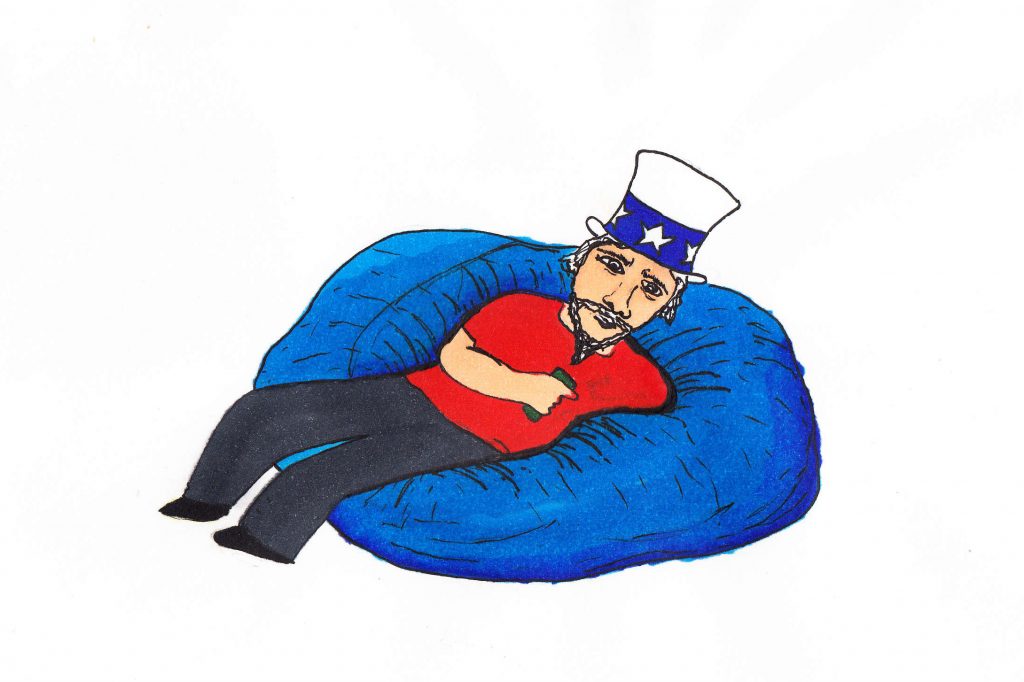
What is the American Dream to you?
Just in case you haven’t quite figured out what exactly that is yet, let me enlighten you as to what mainstream America is trending towards; comfort.
That’s all most of us want. Is trying to be as comfortable as possible in our lives such a sin? Why can’t we live our lives to fulfill their maximum potential for comfort?
There is a lot more to that question than meets the ear.
Ray Bradbury, famed author of Fahrenheit 451, called it. He read the future like a book. His utopian society, built of a people who isolate themselves from human interaction and learning in exchange for technological comforts, such as massive TV’s, and headphones that fit in ears, has never been so brought to life, so real, as it has been in Google’s latest and greatest product, Google Glasses.
Designed as a smartphone for our eyes, Google Glasses are capable of pulling up directions, watching video, reading books, making calls, searching the internet, and so on. If you thought our population, or our culture was obsessed with our phones and our tablets, just wait until we put our glasses on.
If you can, recall the Disney movie WALL-E. Recall a particular scene where this innocent little robot attempts to say hello to humans who are so dependent on their technology, so totally focused on their digital screens, which is strikingly similar to Google Glasses, in front of their faces, that they can’t even take notice of WALL-E. Restricting themselves from all physical and real human interaction, these people’s lives are defined by the material which is on their screen.
These people were so comfortable in their technology, so comfortable with their screens, that they started to lose what made them, to put it best, human. They stopped having intimate conversations with others, and they stopped physical activity. They became so comfortable, they lost sight of the fact that there is more to life than simply being in a state of relaxation.
Though we may not be in a spaceship far away, and though there may not be evil robots dictating our destiny in that space ship, we are quite literally becoming our space traveling counterparts. Google Glasses are only going to accelerate this seemingly unstoppable trend of Americans, though perhaps they think devices such as Google Glasses will bring them closer to friends, isolating themselves from the rest of the world around them, by connecting to a world on screens.
This isn’t some rant on technology. It’s a plea for people to realize that they are evermore increasingly living for comfort, rather living life to it’s fullest by making differences in other lives. Not only is a lifestyle which glorifies comfort as the number one priority detrimental to a person’s life due to it’s seclusion from the outside world, but it is selfish.
What if Martin Luther King Jr. had thought that he would rather get a job as a bus driver, than fight for his race’s rights because he thought it was a more comfortable occupation? There’s more to life than comfort. You may not know what that is yet, what your American Dream is yet.
Get out of your comfort zone and go figure it out.















Saint George • Jun 8, 2014 at 2:17 pm
The article is written about an issue that is actually important. However, the analysis shared is so scattered and undefended that it fails to support the point.
Even the examples used that were relevant are not used effectively; the technology and suppression in Fahrenheit 451 are not for the purpose of physical comfort. They are for the purpose of mental comfort. Fahrenheit 451 is a great criticism of modern society’s desire to have constant pleasant experiences without the conflict of dissenting opinions. Books are banned and burned because they might offend someone. The T.V. shows that are watched have lines of dialogue to be filled in by the viewer, who is given a script. The aspect of modern life criticized most in Fahrenheit 451 is the desire to exclusively promote equality and happiness. Fahrenheit 451 isn’t criticizing technology; it is criticizing the willingness of people to surrender their individuality for the sake of harmony.
Similarly, the article had a good point about the need to sometimes cause conflict, and the examples of Fahrenheit 451 and MLK are both relevant. However, the introduction of technology to this argument merely confused and redirected the article. Instead of an analysis of the necessity of differing opinions, it became the cliché “technology bad” argument. Besides, the comfort provided by technology has much more pressing implications than a loss of human connection.
The more pressing technological issue in modern society is our use of technology in the hedonistic search for physical comfort. Materialistic desires to consume products from across the world, heat and cool our houses, and maintain green grass in arid climates highlight a more pressing issue. Rather than short term consequences to physical conditioning, the more significant issue is the long term damage we are doing to our planet. The bigger problem is not some perceived loss of connection between one person and another, but the loss of personal responsibility. Most people are more interested in their own comfort and convenience than in the long term consequences of their actions.
The article is correct that the quest for comfort can have unseen and devastating consequences. But, this article argues two separate things; primarily that technology is bad, and secondly that comfort is bad. It then mixes examples of why comfort is bad and tries to use them to claim technology is bad. Without a voice amplifier, MLK couldn’t have reached such massive audiences. The Internet is one of the commonly used modern platforms for people to share dissenting opinions. Far from technology separating humanity and ushering in an era where people are afraid to think, technology facilitates discussion and encourages opinions. The article does not focus on the most important aspects of its thesis and instead rants (if you feel the need to say “this isn’t some rant,” it probably is) unnecessarily and unfoundedly about the evils of technology.